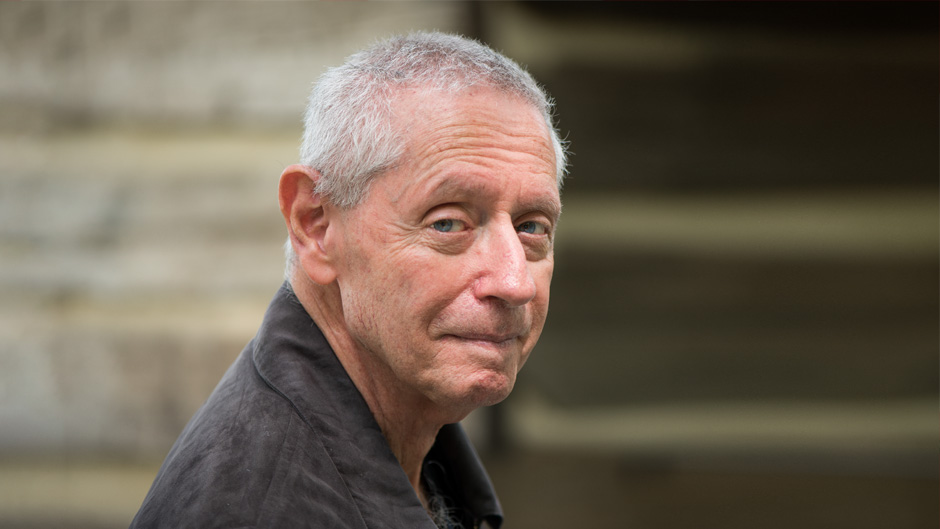Every morning without fail, Cuban-Jewish poet Jose Kozer composes a poem in his native language, Spanish.
His prolific body of work now includes 14,150 poems and more than 103 books of poetry that have been translated into multiple languages. He is revered in Latin America and Spain where his work has been produced by the top publishing houses and where he is admired and touted as a neo-baroque poet.
In 2013, he was awarded the Pablo Neruda Ibero-American Poetry Prize. He has also received the Montgomery Fellowship in 2016 and gave the Guarnaccia Lecture at Middlebury College in 2021. This year he was awarded the Gertrudis Gomez de Avellanda Prize given by City University of New York.
“I have always been very prolific,” said Kozer, who began writing poetry at age 15 in his native Havana. “I believe that the romantic notion that a poet must wait for the muses to appear is hogwash.”
His work is now a legacy that will be enjoyed by many. The Cuban Heritage Collection of the UM Libraries has acquired his documents, papers, notebooks, journals, and published works in a five-year deal that will allow the collection to also inherit his personal library and any future books he may pen.
The 81-year-old former professor now lives in Hallandale Beach with his wife, Guadalupe. Kozer taught Spanish at Queens College, part of the City University of New York, for more than 30 years. He left Cuba when he was 20 years old.
“He is a singular figure in poetry,” said Elizabeth Cerejido, director and Esperanza Bravo de Varona Chair of the Cuban Heritage Collection. “In Kozer, we find a member of a generation of Cuban diasporic producers to whom we must pay homage. Securing this collection for CHC is a way of accomplishing not only that his legacy is preserved as part of the rich patrimony that our collection represents, but it also provides a unique opportunity for current and future scholars to study his important contribution to the field and be motivated to engage with his work in innovative and critical ways.”
The acquisition was made possible by a grant from the Goizueta Foundation, said Cerejido. In addition to the handwritten poems and journal entries that comprise his notebooks, she is particularly enthusiastic about the acquisition of his library, because future scholars will be able to trace the poet’s mindset in each one of his books.
“In the margins of most of his books, he has notes that make reference to his own poetry or to an entry in his diary,” she said. “So these notes provide a road map to his thinking, his process, and how classic texts have informed his own writing.”
Whether it is exploring his Jewish roots (his parents immigrated to Cuba from Poland and Czechoslovakia) or decomposing an intricate musical piece, Kozer’s poetry can be complex, innovative, and unexpected.
Mia Leonin, senior lecturer in the English department, said she first came to know Kozer’s poetry in the anthology, “Bridges to Cuba” edited by Ruth Behar.
“I was fascinated to discover the New York Cuban of Polish parents who writes strictly in Spanish,” she said. “Every time I read one of his poems, I’m reminded of the unique relationship each immigrant has with the language of the homeland,” she added. “With Kozer’s poetry, there’s always the double gift of the poem in its original Spanish and the translation.”
Kozer said his writing often follows the “anacoluto” style. One of the definitions of “anacoluto” is without continuity, according to Buenastareas, a Spanish-language website.
“It is almost like a run-on sentence,” Kozer said. “You are writing something and the material shifts onto something else. It is a reflection of my own mind. I am writing about something and then my mind shifts into something else. I am having fun.”
His style has often been called neo-barroque. Poets who use this style are rooted in 17th century Spanish tradition, but the language contains modern elements of the New World and can often be complex, even a bit chaotic, according to Kozer.
“The difference between us and the original baroque poets is that we live in a much more complex world,” he said. “The difference is that we are modern people and there is so much referential material around us, and a modern poet uses all that.”
The poet also believes that his writing has a curative element for him. When his mother died, he penned “Acta,” a book with 60 poems about his mother. When he showed the poems to his wife (which he does often), she told him not to show any more poems to her because it was too painful.
“I missed my mother,” Kozer said. “But even as I was facing her death I felt no pain while writing the poems.”
He decided to let the Cuban Heritage Collection have all his work because he felt the institution could take good care of the material and the thousands of magazines, letters, and journals that make up the bulk of the collection would be of value to future scholars.
“Even if I am not an important poet, what I have to offer is of value,” he said. “Sociologically what I am giving to the collection, no one else has. It will be invaluable to people interested in Latin American and Spanish literary material.”

